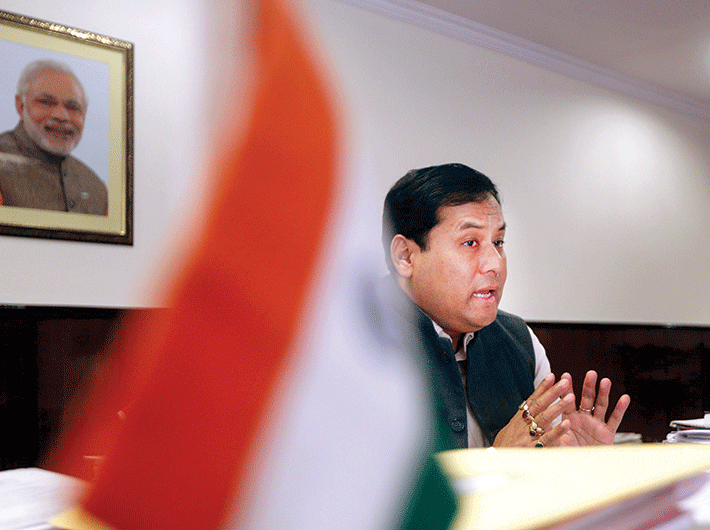Sarbananda Sonowal, a young and firebrand leader, is BJP’s rising star in Assam. He is now in charge of a ministry that does not make many headlines but whose work would be uppermost on the minds of most Indians. Sonowal spoke with Sweta Ranjan about the government’s plans for sports. Edited excerpts:
There is a need for more transpare-ncy in sports administration. What are the efforts of the ministry in this regard?
We are giving instructions to sports federations to bring more transparency and good governance in their day-to-day activities, so that people, especially sports lovers, can get a clear idea of our approach. That’s the way we want to begin making good governance a part of our system.
Everybody will have to be accountable – whatever we are doing we must be accountable to the people. With transparency and accountability, people will be able to give us their valuable suggestions. This is the way to take people into confidence, because we will have to work as a team.
There is a lot of sports talent in the country but we need to spot them. How do you plan to reach out to them?
Our government is taking measures to identify talent in our country, especially in rural areas. Next year we will introduce a national sports talent search scheme. Under this scheme, children in the age group of 8-12 years will participate in competitions from the block, district and state levels throughout the country. Those who qualify will be chosen for the final team and will be groomed for future competitions.
For the forthcoming Rio Olympics in 2016, we have set up a target Olympic podium (TOP) committee. It has already selected 75 elite athletes from different disciplines. They are undergoing training at sports authority of India (SAI) centres. The committee is also going to select a few more candidates. We are targeting a minimum 150 candidates. This will be the team that will represent India.
Given that various federations have taken over respective sports, the sports ministry is left with very little role. Your comments.
As you know, the national sports federations, like the Indian Olympic association, are all autonomous. They are governed by international charters. But we have good coordination, because we will have to develop and improve our relationships. We will have to work as a team. The ministry, SAI, the federations, and the Olympic association. That is the only way. Whatever issues we have, have to be settled amicably.
Don’t you think various bodies have taken different sports in their clutches?
It is not so. There can be some instances, but my job is to unite everybody. That is my sole responsibility as a sports minister. Because sports is a state subject, we need support from all state governments. That’s the way we have to develop our chemistry and understanding of functioningand that is what we are doing.
You have spoken about having a sports complex in every block. Is it workable?
Yes. Of course, state governments are sending proposals.
What if state governments do not cooperate?
Sports is a state subject. You have to take state governments into confidence. This has been defined in the constitution. We will have to go as per the provision of the constitution and this is happening in the country. Many states have been doing well in sports. They are taking a lot of initiatives, doing a lot of work to promote sports and helping sportspersons.
Usually, in such schemes money gets sanctioned but nothing happens in reality.
This particular structure will be constructed by central public sector units (CPSUs). Let us move to transparency. It is not that we are suspecting the integrity of state governments. We respect them, but everybody wants good governance, more transparency and accountability.
Among sports bodies, BCCI, in particular, is controversial for its large funds and lack of transparency. Does the ministry plan to do something about it?
People of India want every federation to become accountable and transparent. This is a democracy and we will have to go as per their desire and expectations.
As for BCCI, the matter is before the apex court. Let the judgment come. But, as I have already said, everyone will have to be accountable.
What is the government doing for boxer Sarita Devi who has been suspended? Sachin Tendulkar wrote to you to help her.
Tendulkar, along with other top sportspersons of the country, have come forward (to help her). We had a meeting. We decided to approach the Amateur International Boxing Association (AIBA) to reconsider her suspension. She comes from a humble background. I have already written to AIBA on behalf of the Indian government, requesting them to revoke her suspension.
Enhanced diet and food supplements for sportspersons are a matter of major concern. How do you plan to tackle this issue?
We are taking this matter very seriously because this issue needs to be actively addressed, because it is related to their growth, their practice, their health and fitness. If we can supply rich quality and enhanced food, it will definitely help players to perform better. This ministry is taking a keen interest and also measures to help our players.
Will there be a special package to promote sports in Jammu and Kashmir?
The election process is on now. We are going to think on this after the polls are over.
India won the gold medal at the Incheon Asian Games. But don’t you think a lot more needs to be done to improve the state of hockey in India?
Yes, we are taking a lot of measures. That is why we recently felicitated the 1964 Olympics greats. This was a measure on our part to promote hockey in our country and now both the teams – junior and senior, are doing well. It is our duty to inspire and encourage them so that they can play better in future.
The interview appeared in December 16-31, 2014, issue

